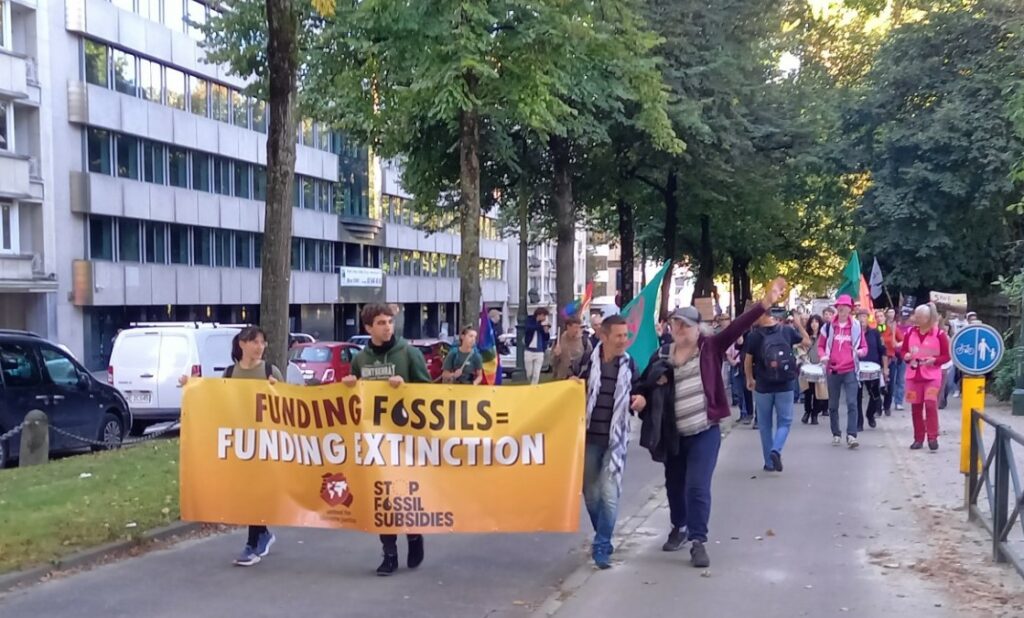United for Climate Justice’s demonstration on Saturday in Brussels called on the EU to phase out fossil fuel subsidies by the 2025 but the message was overshadowed by the arrest of Swedish activist Greta Thunberg who participated in a blockade action.
She was arrested along with nearly 100 climate activists for blocking the road in front of Rogier metro station in central Brussels. The main action, however, was a climate march of over 200 people which began at Place du Luxembourg and ended with a ‘people's assembly on climate justice’ in front of the Cinquantenaire park at Merode.
United for Climate Justice (UCJ) is a platform of climate and social justice movements from several EU Member States (Austria, Belgium, Finland, Germany, Italy, The Netherlands, Poland, Portugal, Spain, Sweden) and other countries (Switzerland, UK), united in the recognition of the need for global climate justice.
Yesterday’s demonstration focused on the need to phase out fossil fuel subsidies and abolish the financial incentives to continue to use such fuels. It is a first and necessary step to pave the way for the reduction of greenhouse gas (GHG) emissions and for the EU to become zero climate-neutral (net zero greenhouse gas emissions) by 2050.
Climate justice
The continued use of fossil fuels is the primary cause of the climate crisis, according to UCJ, yet EU Member States continue to support their use through subsidies. The ‘Stop Fossil Subsidies’ campaign refers to figures from the International Monetary Fund, which estimated the total cost of fossil subsidies in Europe to €405 billion in 2023.
Of this sum, €171 billion direct payments, rebates via tax breaks, or emission trading permits. The IMF also estimated indirect costs or externalities, like the cost of traffic delays, which explains the higher figure used by UCJ. The campaign decided to highlight this estimate based on IMF’s data because it feels it is important to acknowledge that fossil fuels have a social cost through the damage they cause.
The European Commission has also estimated the direct costs of fossil fuel subsidies but arrived at a lower figure.
In a report from November 2023, the European Environment Agency (EEA) wrote that the subsidies remained relatively stable at about €56 billion (2022 prices) over the period 2015-2021, yet increased to €123 billion in 2022 because of high energy prices related to post-COVID recovery and Russia’s invasion of Ukraine.
In terms of absolute value, more than 60% of all fossil fuel subsidies granted in 2022 were spent in three countries: Germany (€21 billion), Italy (EUR 25 billion) and France (€30 billion). Member States are required to include information in their annual national energy and climate progress reports on phasing out energy subsidies, particularly fossil fuels.
According to these reports, many countries have ambitions to move away from fossil fuel use, but only a few (Denmark, Germany, Ireland, Italy and Sweden) have translated these ambitions into laws or clear plans that specify when they intend to phase out fossil fuel subsidies.
Both the ‘Stop Fossil Subsidies’ – campaign and the European Commission refer to the EU’s Eighth Environment Action Programme, which calls for an immediate phase out of fossil fuel subsidies. According to EEA, the sharp rise in subsidies in 2022 could be seen as an exception.
Almost half of the subsidies have a planned end-date before 2025. However, there is no end-date provided or the end-date is after 2030 for the largest part of fossil fuel subsidies. Asked about the phasing out of subsidies, a Commission spokesperson referred to the recent mission letter to the Commissioner-Designate for Climate, Net Zero and Clean Growth (Wopke Hoekstra) in the new Commission.
“You will, jointly with the Commissioner for Energy and Housing (Dan Jörgensen), create a framework to further scale down and phase out the use of fossil fuel subsidies as part of our work to reduce Europe’s dependencies,” Commission President Ursula von der Leyen instructed him.
The Commission was satisfied with the outcome of last year’s UN Climate Conference (COP 28) in Dubai. It greeted the final agreement in Dubai “as a success which keeps alive the possibility of delivering on the Paris Agreement commitment to limit global average temperature increase to 1.5 °C above pre-industrial levels”.
However, the agreement on fossil fuels was vague and used the phrasing 'transition away from fuel fuels', rather than ‘phasing out’ of fossil fuels. The agreement does mention the “phasing out of inefficient fossil fuel subsidies that do not address energy poverty or just transitions, as soon as possible” but without any timeline.
M. Apelblat
The Brussels Times

